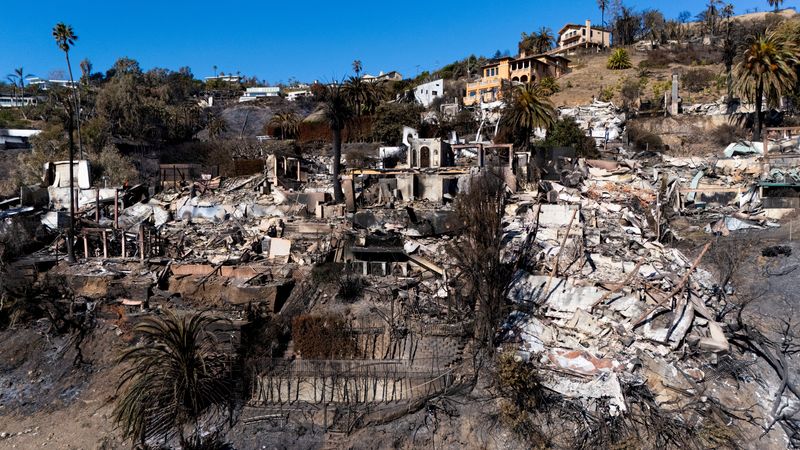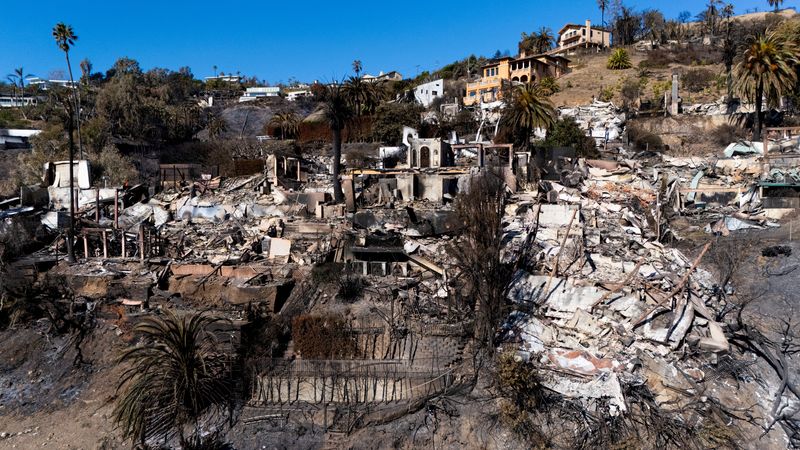
Displaced Los Angeles homeowners face price gouging after wildfires

By Dawn Chmielewski
LOS ANGELES (Reuters) – Jay Gilberg bought a five-bedroom, 4,800-square-foot (446-sq-meter) home in the Los Angeles neighborhood of Pacific Palisades in June to merge two households, bringing his two daughters, his girlfriend, and her teenager together under one roof in what he described as “a very happy home.”
Six months later, that home is gone, one of an estimated 5,000 damaged or destroyed in the Palisades Fire. As he and his real estate agent began searching for a temporary home large enough to accommodate a family of five, they encountered another shock — a sudden spike in rental prices.
One Beverly Hills rental home that had been listed for $14,000 a month suddenly increased by $4,000 overnight — a nearly 29% price hike that the listing agent told Gilberg’s realtor reflected “supply and demand.”
“There are really good people who are compassionate, sympathetic, empathetic, and they want to do something to help,” Gilberg said of the disaster and its aftermath. “And then there are others who … smell an opportunity to profit, and that’s what I encountered.”
Throughout the region, thousands of people like Gilberg, who have been displaced by the wildfires, are encountering sticker shock.
The Los Angeles Tenants Union, a volunteer group that advocates for affordable housing, identified more than 500 property listings where the monthly rental fee abruptly jumped — in some cases, more than doubling.
California Governor Gavin Newsom signed an executive order on Sunday that seeks to curb predatory pricing on essential consumer goods and services, including housing. The order makes it illegal to hike prices by more than 10% above the rates charged immediately before the emergency declaration.
“Though it’s illegal, we know many landlords will try to profit off people’s desperation and get away with it anyway,” said Tony Carfello, an organizer with the Tenants Union, adding that even a 10% increase in rent can be “an impossibility, both for people who lost everything and for the rest of tenants in the city who were already struggling to get by.”
‘EXPLOITED, VICTIMIZED’
California Attorney General Rob Bonta said his office had received hundreds of reports of price gouging and had opened multiple investigations.
“This is just unimaginable conduct during this time when people need the exact opposite of being preyed on, exploited, victimized. They need support and healing and help,” Bonta said on Thursday at a news conference.
He urged the public to send in screenshots, text messages, e-mails or any other evidence to help prosecutors build a case.
Gilberg’s real estate agent, Lori Goldsmith, criticized the gouging, saying she walked away from one longtime client who sought to capitalize on other people’s misfortune.
“It is so wrong,” Goldsmith said. “These people have lost every memory. These people with small children have lost their favorite lovies that they went to sleep with every night that made them feel like they had a security blanket wrapped around them.”
County Supervisor Lindsey Horvath, whose district includes the entirety of the Palisades Fire, said she takes the issue of price gouging on rents and housing “very seriously.”
“People are suffering and they need the security of knowing that we are going to protect them from anyone who would prey on them in a moment like this,” Horvath told Reuters outside a FEMA disaster recovery center in Los Angeles on Wednesday.
Those displaced by the wildfires are struggling.
Renee Weitzer, an 87-year-old Holocaust survivor, lost the Sunset Mesa home she shared with her 88-year-old husband, Ed. They escaped the approaching wildfire with their medication, some important papers, their dog and a single change of clothing, thinking they would quickly return home.
Instead, they have spent more than a week living out of a hotel room, trying to find a home to rent. The competition with other renters has been fierce, she said. The Weitzers offered to pay $14,000 a month rent for a home listed at $8,000 — with a year’s rental payments upfront — but still lost out.
“We’ve lost every house,” said Renee Weitzer. “And not only that, when you have to apply with the application, you have to pay for your credit check.”
The Weitzers plan to move into a nephew’s single-bedroom apartment in West Hollywood on Friday, while they work through the insurance claim process and decide their next move.
“It’s gonna take a while,” Weitzer said. “Whether we could ever rebuild, it’s questionable at our age, because it’s gonna take years to be able to do this right …. I don’t think we’ll be able to rebuild.”


